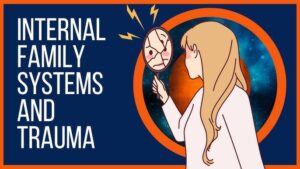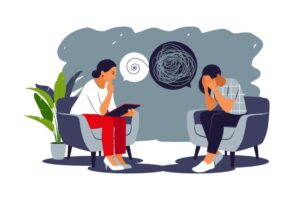Obsessive-Compulsive Disorder, also known as OCD, is a mental and behavioural disorder characterised by recurrent unwanted thoughts (obsessions) and repetitive behaviours (compulsions). There are more than a million cases of OCD in India per year and OCD Treatment online in India follows a straightforward path which has been discussed later. Given its widespread occurrence and insidiousness, it is helpful to have adequate knowledge about it.
Despite what media and pop culture have us believe, OCD is not a euphemism for being neat and organised. The main difference between the two is that people with OCD engage in obsessions and compulsions that are long-lasting, uncontrollable, and significantly interfere with their day-to-day lives. Being neat and organised is preferential whereas OCD is not. Considering certain numbers as lucky or unlucky, creating a rigid pattern of lifestyle, avoiding situations where fears may be triggered, being consumed by feelings of anxiety are some of the most commonly known attributes of the disorder. So sneaky these attributes can be that OCD has often been described by many as a ‘silent enemy’.
Earlier considered an anxiety disorder due to the high levels of anxiety involved, it now falls under a separate section in the revised edition of the Diagnostic and Statistical Manual of Mental Disorders published by the American Psychiatric Association. In the initial stages it can be hard to recognise the symptoms and separate them from having a perfectionist personality. According to medical professionals, it is marked by the following symptoms that are the most common:
Obsessions
- Recurrent worry about loved ones’ safety.
- Distressing thoughts related to sex, religion, and violence.
- Excessive worry about being contaminated by other people or the environment.
- Need for symmetry, orderliness, and neatness.
- Fear of harming yourself or others. Compulsions
- Excessive hand-washing, even to the point that your hands become injured.
- Constantly repeating certain words or numbers.
- Repeatedly checking locks, doors, stoves, appliances to see if they are closed/off.
- Need for repeated reassurance.
- Over the top neatness and orderliness.
The onset of this debilitating disease usually occurs during adolescence but can also happen during childhood or young adulthood. Fluctuations are seen in the progress of OCD as stressful events can trigger an increase in the symptoms and make it harder to manage daily life. Although treatment can help, it is a chronic condition and cannot be completely cured.
There are no known causes for OCD. Genetics and environment both seem to play a role in leading up to it. Adverse childhood experiences and parental prevalence are two general preceding factors that put individuals at risk. Additionally, individuals with OCD are at a high risk of having comorbid anxiety and depression.
When to Visit a Doctor?
As mentioned earlier, it can be hard to identify OCD in the initial stages as during this stage, there is a thin line of difference between simply being fussy and picky, and having a disorder. As per research data, people usually take two to three years to finally reach out to a doctor in order to address their symptoms. A useful rule of thumb in this case is that if your symptoms are significantly hampering your daily life and causing you much distress, you should schedule an appointment with a mental health professional to rule out the disorder. On such a visit, psychological assessment and a series of exploratory questions can be expected which create a better understanding of the problem.
What OCD treatment in India looks like?
OCD treatment in India, as well as pretty much anywhere else, usually involves psychotherapy or medication or both. The most commonly used psychotherapy with OCD clients is Cognitive Behavioural Therapy (CBT). Exposure and Response Prevention and Acceptance and Commitment Therapy are some forms of CBT, out of which Exposure and Response Prevention has been found to be the most effective.
In Exposure and Response Prevention, the client is brought in contact with their feared object and is restricted from engaging in ritualised behaviour. These encounters are performed in a gradual manner in order to give an opportunity to the client to feel comfortable enough. It has been found that over time this method reduces the fear associated with the object, replacing it with normalcy.
The second common treatment method is the use of medications which typically include SSRIs (Selective Serotonin Reuptake Inhibitors), anxiolytics, and antidepressants.
Conclusion
OCD is often unpleasant and overwhelming for the individual going through it. Support from loved ones and incorporating self-care activities in one’s routine can make a world of difference. Knowing that one is not alone in their battle and that if dealt with care, symptoms can be managed appropriately and the quality of life can be enhanced, results in bringing about a positive change in perspective.
Reaching out for help can be scary. However, it is the first important step in changing your life for the better. The sooner you reach out to professionals, the earlier interventions can lead to a more stress-free life.
How can CoachForMind help?
Licensed Psychologist: We are a team of licensed RCI-registered clinical psychologists. Our team has best practices for panic attacks treatment in India
Tailored Solutions: We at CoachForMind understand the individual need which is why we offer client-centric one-on-one therapy.
Proven Techniques: Our approach to therapy is grounded in scientific research such as Cognitive behavioral therapy and Dialectical behavioral therapy. These therapies are designed for people who experience intense mood swings. These therapies help people who have potentially destructive or harmful behavior.
Commitment to Excellence: We are dedicated to delivering the highest quality of service and continuously improving our offerings based on feedback and emerging trends. Our therapists regularly upskill themselves as per the new norms.
For more information please visit our website or contact us directly at coachformind@gmail.com




